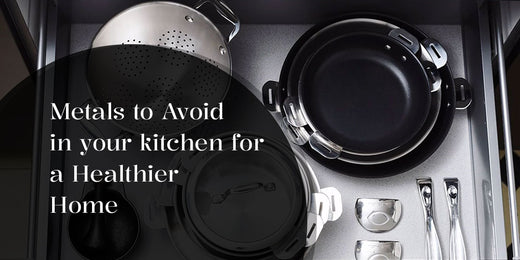Choosing the right cookware is essential for maintaining a healthy kitchen, and understanding the differences between materials like aluminum vs stainless steel pans can make all the difference. Aluminum pans, while lightweight and affordable, can leach harmful metals into food, especially when cooking acidic dishes. On the other hand, stainless steel pans are known for their durability, resistance to corrosion, and safety. When deciding between aluminum vs. stainless steel pans, it's crucial to consider the potential health risks and benefits to ensure your kitchen is a healthier environment for your family.
Why is it important to know what's in your kitchen?
When it comes to your kitchen, you might think that the biggest decision is what to cook for dinner. However, the cookware you choose can have a profound impact on your health and the environment. Toxic cookware isn't just a buzzword—it's an important issue that affects everyone who spends time in the kitchen.
The dangers of cooking with toxic metals: health risks and environmental impact
Cooking with toxic metals can pose significant health risks. Prolonged exposure to these materials may lead to serious conditions, including neurological disorders, hormonal imbalances, and even cancer. Heavy metals like lead and cadmium are particularly concerning as they accumulate in the body over time.
The impact extends beyond personal health. When toxic cookware is disposed of improperly, harmful substances can leach into soil and waterways. This pollution affects wildlife and ecosystems alike.
Metals for Cooking: Stainless Steel, Cast Iron, Ceramic, Titanium, and Copper
When it comes to cooking, the type of cookware you choose can significantly affect your culinary experience. Here are five metals that stand out.
- Stainless steel is a kitchen favorite for its durability and resistance to rust. It doesn’t react with acidic foods, making it versatile for various dishes.
- Cast iron is renowned for heat retention and distribution. With proper seasoning, it becomes naturally non-stick and adds iron to your food.
- Ceramic isn’t metal but deserves mention due to its non-toxic nature. It's excellent for even heating while being aesthetically pleasing in any kitchen setting.
- Titanium cookware offers lightweight durability and exceptional strength. It’s resistant to scratches and corrosion, ideal for frequent use.
-
Copper heats quickly and evenly, providing precise temperature control. However, it's essential to line copper pans with another metal to prevent reactions with certain foods.
Disadvantages of brass utensils
Brass utensils, while durable and visually appealing, can react with acidic or salty foods, releasing harmful toxins like zinc and copper into your meals. Additionally, improper maintenance can lead to corrosion, affecting both the taste and safety of your food.
Benefits and Drawbacks of Each Metal
- Stainless steel is a favorite among cooks. It’s durable, resistant to rust and staining, and doesn’t react with acidic foods. However, it can be poor at conducting heat evenly.
- Cast iron cookware is beloved for its heat retention and natural non-stick qualities when seasoned well. But it's heavy and requires regular maintenance to prevent rusting.
- Ceramic cookware offers a beautiful aesthetic along with being non-reactive. It's easy to clean but may chip or crack over time if mishandled.
- Titanium cookware is lightweight yet incredibly strong, making it ideal for camping or outdoor cooking. On the downside, it often comes at a higher price point compared to other metals.
- Copper heats up quickly and distributes heat uniformly, providing excellent cooking results. The trade-off? It’s prone to tarnishing and requires polishing while also reacting with certain foods unless lined properly.
Tips for Choosing the Right Cookware for Your Cooking Needs
Choosing the right cookware can feel overwhelming with so many options available. Start by considering what type of cooking you do most often. Do you sauté, bake, or simmer? Each method may require different materials.
Think about heat conductivity as well. Metals like copper provide quick and even heating, while cast iron retains heat exceptionally well for slow-cooked dishes.
Evaluate your kitchen space too. If storage is limited, opt for stackable or versatile pieces that serve multiple purposes.
Don’t forget about weight! Heavier pans are great for stability but might be cumbersome if you need to maneuver them frequently.
Lastly, consider compatibility with your stovetop and oven. Some cookware works better on gas stoves than electric ones, which could affect your cooking experience significantly.
Why Investing in Quality Cookware is Essential for Your Health and Cooking Experience
Investing in quality cookware goes beyond just aesthetics. It plays a crucial role in your health and overall cooking experience. The right materials can influence not only the flavor of your meals but also their nutritional value.
When you choose metals like stainless steel, cast iron, titanium, or copper, you're opting for durability and performance. Each metal has unique properties that enhance different cooking styles. Moreover, understanding how to care for these materials ensures they last longer and maintain their efficiency.
At ALCU, we're committed to helping you make safer, healthier choices for your kitchen. By avoiding harmful metals and opting for high-quality, safe cookware, you can create a healthier home environment for your family. Choose wisely, choose ALCU for kitchen safety you can trust.





